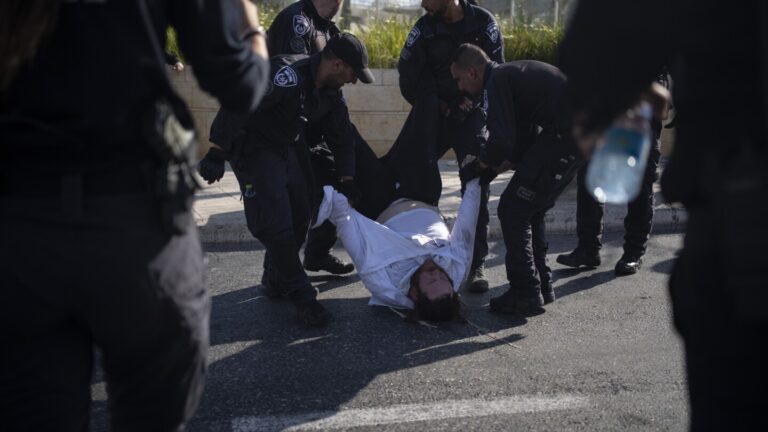JERUSALEM (AP) — Israel’s Supreme Court ruled unanimously Tuesday that the army must start conscripting ultra-Orthodox Jewish men into military service, a ruling that could lead to the collapse of Prime Minister Benjamin Netanyahu’s coalition government as Israel continues its war in Gaza.
The court ruled that Israel’s compulsory military service applies to ultra-Orthodox Jews in the same way as other citizens because there is no law that distinguishes between seminary students and other people subject to conscription.
A longstanding arrangement has exempted ultra-Orthodox men from military service, which is mandatory for most Jewish men and women, an exemption that has long been a source of anger among the secular public. The widening gap The military has called up tens of thousands of soldiers and said it needs all the manpower it can get during the eight-month war. More than 600 soldiers have been killed.
The politically powerful ultra-Orthodox parties are Netanyahu’s main partners in the government. Oppose any change Under the current system, if the exemption were to be abolished, it would mean leaving the coalition government, which could collapse and lead to new elections.
During arguments, government lawyers told the court that forcing ultra-Orthodox Jewish men to enlist would “divide Israeli society.”
The ruling comes at a delicate time, as the war in Gaza enters its ninth month and the number of soldiers killed continues to rise.
The court ruled that the state engaged in “invalid selective enforcement that represents a serious violation of the rule of law and the principle that all individuals are equal under the law.”
It has not been made clear how many ultra-Orthodox Jews should be conscripted.
The court also ruled that state subsidies to seminaries where exempt ultra-Orthodox men study should remain suspended. Temporarily frozen The seminary’s budget earlier this year.
Yitzhak Goldknopf, head of one of the ultra-Orthodox parties in the government, said in a post on the social media platform X that he was “very disappointed and disappointed” by the ruling. He did not say whether his party would leave the government.
“The State of Israel was founded to be a homeland for the Jewish people whose foundation of existence is Torah. The holy Torah will prevail,” he wrote.
Ultra-Orthodox believers see full-time religious study as their role in protecting the state of Israel, and many fear that increased contact with secular society through the military will cause them to less strictly follow their faith.
Ultra-Orthodox men attend special seminaries that focus on religious studies and pay little attention to secular topics such as math, English and science. Critics say they are ill-prepared to serve in the military or join the secular workforce.
Religious women receive blanket exemptions that are generally less controversial, in part because women are not expected to serve in combat units.
The ruling risks increasing friction within the coalition government between those who support and those who oppose increasing the number of ultra-Orthodox lawmakers. Ultra-Orthodox lawmakers are likely to face intense pressure from religious leaders and voters, and may have to choose whether staying in power is worth it for them.
Shuki Friedman, vice president of the Jewish Policy Institute, a Jerusalem think tank, said ultra-Orthodox Jews “understand that they don’t have a better political option, but at the same time, the public is saying, ‘Why did we vote for you?'”
The exemptions have been the subject of years of legal battles, with a series of court rulings finding the system unfair, but Israeli leaders have repeatedly delayed them under pressure from ultra-Orthodox parties. It is unclear whether Netanyahu can do so again.
Netanyahu’s coalition government is backed by two ultra-Orthodox Jewish parties that oppose expanding military enlistment. The longtime Israeli leader has sought to maintain the coalition while also abiding by the court ruling, but with a slim 64-seat majority in the 120-seat parliament, he is often tied to the agendas of smaller parties.
Netanyahu has been pushing ahead with a bill introduced by the previous government in 2022 to address the issue of ultra-Orthodox Jews enlisting in the military.
But critics say the bill was written before the war and is insufficient to address looming personnel shortages as the army seeks to maintain forces in the Gaza Strip while preparing for a potential war with Lebanon’s Hezbollah, which has been fighting Israel since the Gaza war erupted last October.
Ultra-Orthodox Jews have a high birth rate and the highest population growth rate of any group, at about 4 percent per year. According to the Israeli parliament’s National Control Committee, about 13,000 ultra-Orthodox Jewish men reach the conscription age of 18 each year, but fewer than 10 percent enlist.
__
Associated Press writer Isaac Shaaf in Jerusalem contributed to this report.

